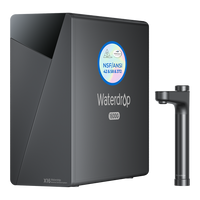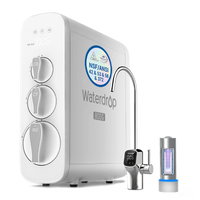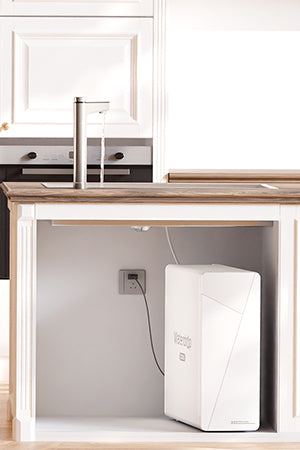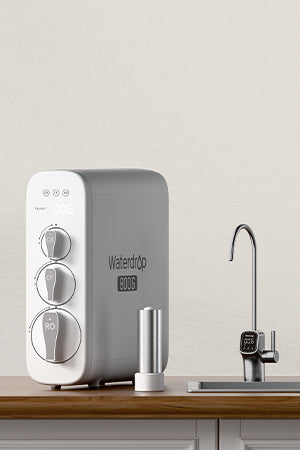Vancouver is celebrated for its stunning natural scenery, featuring lush forests, snow-capped peaks, clean city streets, and refreshing sea breezes. Yet, when it comes to the essential matter of drinking water, many locals and visitors still ask: Is Vancouver's tap water safe to drink?
In summary, Vancouver's tap water is considered among the best worldwide. However, there are important factors concerning the water's cleanliness, origins, and techniques to ensure its safety in every situation.
This blog will explore all relevant details about Vancouver's tap water, focusing on its origin, purification process, and safety for children, tourists, and those with weakened immune systems.
Where Does Vancouver's Tap Water Come From?
The drinking water of Vancouver is sourced from three safeguarded mountain reservoirs:
Capilano , Seymour, and
Coquitlam . These watersheds form an untouched and strictly controlled area, leading to limited public entry to protect water quality.
As a result, Metro Vancouver's tap water is categorized as "surface water," naturally clean and requiring less chemical processing compared to many cities that rely on underground or river water sources.
What Is the Treatment Process?
High-Tech Filtration and Sanitization
Metro Vancouver processes its water, even though the source is clean. This is done to meet and exceed Canadian drinking water rules. The therapeutic procedure encompasses:
This makes sure the drinking water is safe. Free from harmful germs like Giardia, Cryptosporidium, and E. coli. It also protects against viruses and parasites.
Is the Tap Water in Vancouver Potable?
Most of the time, most people can feel safe.
Indeed, the tap water in Vancouver is potable and safe for direct consumption in residential, public, and dining establishments. The city's water constantly complies with national and provincial safety regulations.
Nonetheless, certain exceptions or circumstances warrant caution:
Advisories for Boil Water
From time to time, a boil water advisory might be announced for specific areas, typically due to maintenance work, pipe damage, or flooding. These advisories are temporarily issued by local health authorities or Metro Vancouver.
Antiquated Plumbing and Lead Issues
Lead plumbing parts or service lines in homes constructed before the 1950s may leak trace levels of lead into the water. Although Vancouver's water lacks lead, contaminants might be introduced by the plumbing system.
When residing in or visiting an older structure, take into account:
- Allowing cold tap water to run for one minute before consumption.
- Utilizing a certified water filtration system that eliminates lead.
- Testing your water if you have concerns.
Is Vancouver's Tap Water Safe for Infants and Pregnant Women?
Tap water in Vancouver is mostly safe for healthy persons, especially pregnant women and newborns. Infants and fetuses are extremely sensitive to pollutants like lead. Families living in older buildings should be more careful.
- A water boil does not eliminate lead.
- To lower danger, use a certified faucet filter or a reverse osmosis (RO) water purifier.
- Breastfeeding mothers may consume tap water unless particular advice is issued.
Is Tap Water Safe for Tourists to Consume in Vancouver?
If you are arriving from a nation where tap water is unsafe, you may be astonished to discover that the tap water in Vancouver is safe for consumption. Many tourists perceive it as cleaner as and more palatable than bottled water.
Advantages of consuming tap water in Vancouver for tourists:
- Purchasing bottled water is unnecessary; it is more economical and environmentally sustainable to refrain from doing so.
- Effortless hydration on hikes, urban excursions, and dining establishments.
- Suitable for dental hygiene and culinary activities in hotel rooms or Airbnbs.
What about Smell and Taste?
The majority of individuals perceive Vancouver's tap water as refreshing, pure, and subtly flavored. Nonetheless, there may be minor variations in flavor or aroma over the year because of:
- Variations in reservoir conditions because of seasonal changes.
- Fluctuating chlorine concentrations.
- Divergences in plumbing systems among edifices.
A carbon filter or pitcher filter can help eliminate any remaining chlorine and enhance flavor if you have a sensitive palate.
While a water filter is not necessary for good health in Vancouver, many people choose to use one for extra peace of mind. This is especially true for those with:
- Antiquated plumbing.
- Delicate gastrointestinal systems or hypersensitivities.
- Infants or senior relatives.
- Apprehensions regarding the taste or odor of chlorine.
Prevalent Filtering Alternatives
- Faucet-mounted filters: Convenient and economical for culinary spaces.
-
Reverse osmosis systems : Eliminate the majority of pollutants, including toxic metals and microplastics.
- Pitcher filters: Practical and economical for households.
Vancouver's Bottled vs. Tap Water
In general, bottled water provides no substantial safety or quality benefit compared to Vancouver tap water. Many bottled water companies are essentially filtered tap water sourced from various municipalities.
Water in bottles could be helpful when:
- You are trekking or distant from replenishment stations.
- You favor sparkling water.
- You desire a beverage with flavor.
But for everyday hydration at home, tap water in Vancouver is a more cost-effective and environmentally friendly option.
Summary
Vancouver is not just one of the most aesthetically pleasing cities globally, but it also possesses some of the purest tap water on Earth. Under normal conditions, tap water in Vancouver is safe for residents, tourists, and parents of infants..
However, people living in older buildings or with specific health concerns might discover that adding a premium
water filter boosts their confidence and peace of mind.










































































